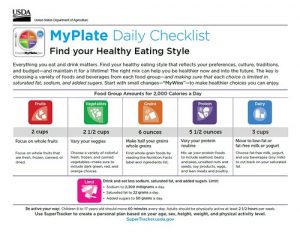Eating The Proper Foods Before Your Workout
We have all heard of the importance of a balanced diet, but what does that actually mean? Many of us tend to take the easy route when deciding what our next meal is. Whether that’s choosing something quick like take out, or throwing something into the microwave, sometimes we choose convenience over nutritional value. Poor nutrition and an unbalanced diet can affect our overall health and well being, our sleep, and lead to complications like heart disease and diabetes. Understanding the basics of nutrition is the first step you need to take in order to start and maintain a healthy, well-balanced diet. There are six major nutrients essential to us; these include carbohydrate, fats, proteins, vitamins, minerals, and water. Below, you will find a daily nutritional checklist recommended by the USDA as a resource for what your daily dietary consumption should be.

Once we understand the foundation of a healthy diet and the major nutrients, we can start looking at what types of food are important for us to consume before working out. Being conscious about what you are putting into your body before a workout, as well as the timing of your meal is very important. Also, it is worth noting how our bodies store and use specific foods for energy during a workout. Depending on the individual and type of exercise, our bodies prefer certain nutrients to provide us with energy. For example, during a higher intensity workout, your body needs a meal consisting mainly of carbohydrates. Our body breaks down these carbohydrates from our food and converts them into glucose (sugar), which is stored and used for energy. Eating healthy carbohydrates such as whole-wheat toast, whole-grain pasta, brown rice, and fruits and vegetables can help improve your performance and give you extra energy during your workout. Another major nutrient our body relies on for energy is fats. When we hear the word “fats,” most of us think of unhealthy foods, but there are many healthy fats to consider consuming before exercise. Fats can be used to produce a large amount of energy, however, this process takes a little longer. For longer and less intense workouts, the consumption of fats would be ideal. Examples of healthy fats to include in your pre-workout meal would include avocado, nuts, peanut butter, and fruit smoothies. The next major nutrient to discuss is protein. Pre-workout meals containing proteins can have many benefits, including preventing muscle damage, improving muscle recovery, and increasing strength and muscle performance. Some proteins to consider include fish, Greek yogurt, beans, skinless poultry, and cottage cheese.
When Should I Eat My Pre-Workout Meal?
Not only is food selection important before your workout, but the timing of that meal is as well. We have all experienced the last-minute effort to force something down before a workout for some quick fuel. What we forget to realize is the timing of this meal can affect how productive and efficient we are. Ideally, consuming a complete meal consisting of all of the major nutrients 2-3 hours before a workout is best. In the case where you find yourself rushing to get those last minute nutrients in, your meal should be on the lighter side to avoid any stomach distress, and should consist mainly of carbohydrates and proteins. Additionally, make sure you give yourself at least 45 minutes prior to your workout. If you do decide to include some fats in this last minute snack, keep the quantity smaller, as the process to breakdown fats for energy is slower than that of carbohydrates and proteins.
Are Supplements Good For Me?
Pre-workout supplements can be beneficial to your workout and can include, but are not limited to, creatine, caffeine, and branched chain amino acids (BCAA). Creatine can be found in a powder form and is easily mixed into water or juice. Creatine acts to help increase muscle mass and delay fatigue after your workout. Another helpful supplement is caffeine. Many athletes use caffeine to increase performance, decrease fatigue, and stimulate fat burning. Caffeine is most beneficial 30-90 minutes after consumption. The amount of caffeine should be monitored if you have certain health issues, and it should be used in moderation. Branched chain amino acids (BCAAs) are another supplement that can be found in a powder form and mixed with water or juice. BCAAs consist of three essential amino acids, or proteins. The word “essential” means that our body can’t produce this, so it must be acquired from food. BCAAs can decrease muscle damage, muscle fatigue, and reduce muscle soreness. Supplements can be a great alternative if you find yourself pressed for time, however, they should be used in conjunction with other major nutrients and not used as a replacement.
H2O
Proper hydration is just as important as the foods you choose to eat before your workout. According to the American Council on Exercise, we should drink 17-20 ounces of water 2-3 hours before working out, an additional 8 ounces 30 minutes before starting your workout, and 7-10 ounces every 20 minutes of exercise. Gatorade and other sports drinks with electrolytes are only necessary if the duration of your exercise exceeds 90 minutes. These recommendations can differ person to person and change depending on weight, age, and gender.
Click On The Link Below For 4 Easy Meals To Consider Before Your Workout!
In summary, proper nutrition before you exercise is key to how productive your workout will be. Consider the type of exercise program you will do and choose certain nutrients that will benefit that specific workout. Remember, a full meal 2-3 hours prior to your workout including all essential nutrients and proper hydration is recommended for optimal performance. Pre-workout nutrition is not one-size fits all. Experiment with timing and food choices to determine the best option for you.
Resources:
Essentials of Strength Training & Conditioning. Third Edition. NSCA. Baechle, Earle.
Healthline.com/nutrition
Womenshealthmag.com
USDA/American Council on Exercise

